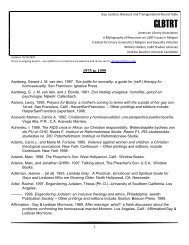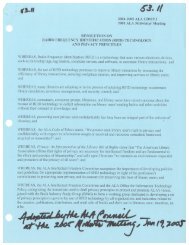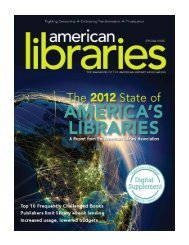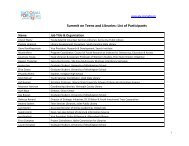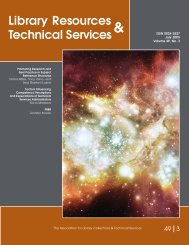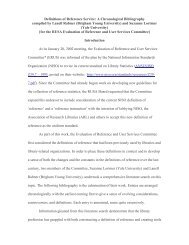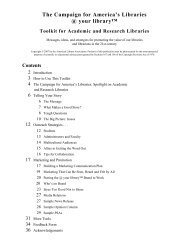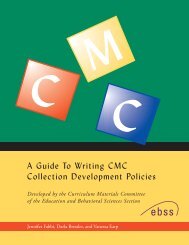Toolkit for School Library Media Programs - American Library ...
Toolkit for School Library Media Programs - American Library ...
Toolkit for School Library Media Programs - American Library ...
Create successful ePaper yourself
Turn your PDF publications into a flip-book with our unique Google optimized e-Paper software.
distribute bookmarks with quotations about reading<br />
or books, or suggestions <strong>for</strong> reading. These are<br />
popular with students.<br />
● Finally, we have a Karaoke Day twice a year. The first<br />
is right be<strong>for</strong>e winter break, and the second right<br />
be<strong>for</strong>e the end of the school year. We in<strong>for</strong>m<br />
teachers that they may bring their students to the<br />
library <strong>for</strong> some Karaoke fun, if they feel their<br />
students have earned this extra privilege. These<br />
events give kids a chance to strut their stuff in a very<br />
non-threatening environment. They get to see their<br />
peers and teachers sing and have fun. They see their<br />
librarian and know her on a more intimate level.<br />
In today’s world, the library is more than just a place to<br />
check out books. It is a place that reflects the real world,<br />
from books, to technology, to game playing to singing<br />
karaoke. Some may argue that Karaoke has nothing to<br />
do with learning or education. But believe me, it gets<br />
students and staff into the library. Our students go away<br />
with a positive experience, and they come back <strong>for</strong><br />
more. Our library is a busy place, during the day, during<br />
lunch and after school. We literally have to kick students<br />
out when it’s time <strong>for</strong> us to go home. Of course the<br />
bottom line is whether they are using the resources<br />
available to them—and they definitely are.<br />
We have a very difficult and challenging population at<br />
Woodlawn — students whom many have given up on.<br />
Our goal is to make the library an inviting place. In order<br />
to do that, the library must meet their needs. Sometimes<br />
those needs include having a good time in a safe place.<br />
We give them the tools to improve their lives, we give<br />
them positive encouragement, and we give them a safe<br />
place where they can feel good about who they are. If<br />
the library can be a place of fun as well as learning, then<br />
I think we are doing our jobs.<br />
Rebecca Frager is a school library media specialist at<br />
Woodlawn High <strong>School</strong> in Baltimore County, MD. She can be<br />
reached at rfrager@bcps.org.<br />
Addressing Your <strong>School</strong> Board:<br />
Tips You Can Use Now<br />
by Sandy Schuckett<br />
Very often, in the course of “school library life,” it<br />
becomes necessary to speak be<strong>for</strong>e your local school<br />
31<br />
board either to insure funding <strong>for</strong> your library program,<br />
or in the worst-case scenario, to save your job.<br />
Although this may seem daunting to some, in reality it is<br />
quite simple! Anyone who stands be<strong>for</strong>e classes of kids<br />
all day or who provides staff development sessions <strong>for</strong><br />
their school faculties can be equally effective in front of<br />
the school board. Imagine that they are all third graders,<br />
and it will be easy!<br />
● Have your message clearly in mind. Emphasize<br />
three, and no more than five, major points. Use<br />
facts and figures <strong>for</strong> emphasis where needed, and<br />
always focus on the benefits to kids. You will<br />
probably have a very short time in which to speak—<br />
usually three minutes, and rambling on doesn’t<br />
work.<br />
● Write the presentation out. Use a large font, and<br />
double-space it so you can read it or refer to it<br />
easily. Underline or highlight the most important<br />
points. Read it aloud in advance, and be sure that it<br />
fits within the time allotted. If you read it over<br />
several times, it will become very familiar to you,<br />
and you can just use the paper as a prompt. But<br />
don’t veer off the text too much because it will use<br />
up your time.<br />
● Smile and look each board member in the eye.<br />
Reach them on a human level, and make them listen<br />
to you! DO NOT bury your nose in your notes—this<br />
will make <strong>for</strong> a very boring presentation. Be sure you<br />
are close enough to the microphone to be heard<br />
clearly. Don’t mumble.<br />
● Do not use library lingo. No one will understand it.<br />
Speak in very simple, basic terms about how a<br />
strong school library program advances student<br />
achievement. Quote research briefly, and let them<br />
know where they can find more details. If you can<br />
bring visuals that will enhance the presentation, do<br />
so. Colorful graphs or charts that make facts and<br />
figures visual work very well, and you can hold them<br />
up (or have a colleague do so—or, even a kid!) while<br />
you are quoting the figures.<br />
● Be passionate! Passion is contagious, and your<br />
passionate presentation will get and keep their<br />
attention. If you can add humor–do it! People like to<br />
laugh.<br />
● Recruit someone to speak <strong>for</strong> you. It often works<br />
better if parents, teachers, other community<br />
members, or even kids talk about your library



